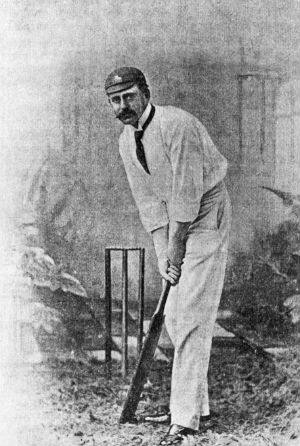If you think crowd trouble at sports events is a modern phenomenon, think again, as the unsavoury events of February 8th 1879 will testify.
That was the date, 139 years ago today, of an international cricket match played at what is now Sydney Cricket Ground, between an English touring side of ‘amateur gentlemen’ and the home team, New South Wales. The events of that day would become known as The Sydney Riot of 1879 after a controversial umpiring decision sparked a pitch invasion by around 2,000 spectators, with several of the English team being assaulted.
Sections of the crowd were unhappy that one of the two umpires was from the neighbouring state of Victoria. The tradition was that each team hired an umpire for the match, but the home crowd was suspicious of the visitors employing a man from Victoria. An intense rivalry existed between the two states and some spectators believed the umpire, George Coulthard, would be biased.
The match had begun the previous day, with the visitors, captained by cricketing enthusiast Lord Harris (pictured), winning the toss and choosing to bat first. Against expectations, they put on 125 for the first wicket and, despite a lower order collapse, went on to make 267 all out. In reply, New South Wales were 53 for two at close of play on the first day.
The next day was a Saturday and when play resumed there was a much larger crowd of around 10,000 at the Sydney Ground, elements of which were noted to be rowdy and ‘in drink’. The home side started well, but when the visiting bowlers found their form, wickets tumbled throughout the afternoon to see New South Wales all out for 177. The prevailing rule required the home side to follow-on (bat again) as they were more than 80 runs in arrears, and they started their second innings at around 4pm.
The spark that lit the flames came when opening batsman Billy Murdoch was adjudged ‘run out’ on just 10, with unpopular umpire Coulthard making the call. Many in the crowd began shouting their disagreement. There were even groundless rumours that Coulthard had bet on the English side to win, especially as he had judged Lord Harris ‘not out’ in another disputed decision the previous day.
As the crowd called for dismissed batsman Murdoch to return to the crease, it became obvious that New South Wales captain Dave Gregory was not sending out another batsman to replace him. When Lord Harris approached his opposing captain, Gregory asked him to replace his umpire, but Harris refused because he believed Coulthard’s decision was fair and correct. He was supported by the second umpire, Edward Barton, who was hired by the home team and would later become Australia’s first Prime Minister.
At this point that around 2,000 angry spectators surged onto the pitch to make their feelings known, jostling Coulthard and lord Harris, who was struck with a stick or whip. Several other English players were pushed and shoved as they tried to intervene, two of them pulling a stump each for protection as they escorted Lord Harris safely off the field.
Another of the Englishmen, Albert ‘Monkey’ Hornby, was a keen amateur boxer and showed no hesitation in apprehending one of the men who had assaulted his captain and marching him off the pitch, despite being attacked himself and nearly losing his shirt. In the crowd, an English naval captain had his top hat pulled down over his ears and was verbally abused by the unruly Aussies!
After 30 minutes the pitch was cleared, but home captain Gregory still insisted that Coulthard be replaced. Lord Harris stood his ground and refused, prompting Gregory to reply: “Then the game is at an end.” He changed his mind when umpire Barton said he would award victory to the English if the home team’s batsmen didn’t return to the pitch within two minutes.
They did return, but before play could resume the pitch was invaded a second time, the crowd remaining there until the scheduled end of play. The Sydney Herald reported that Lord Harris maintained his position on the ground, “standing erect” among the invading spectators and with “moustache bristling”.
Thankfully the next day (Sunday) was a rest day and when play resumed on Monday – another working day – the crowd was much smaller and more reserved. The New South Wales team suffered a batting collapse, making just 49 in their second innings, which meant England had no need to bat again, having won the match by an innings and 41 runs.
The disgraceful scenes dominated Australian newspapers, even eclipsing a raid by infamous bushranger Ned Kelly and his gang. The papers were united in condemning the riot, calling it a national humiliation and a public relations disaster. In short, it simply wasn’t cricket!
